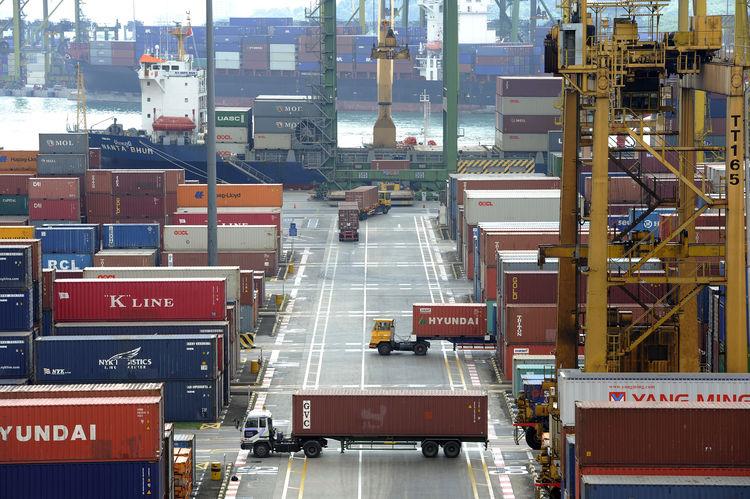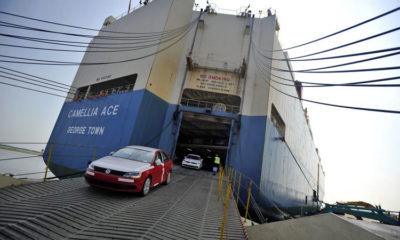By Coronation Merchant Bank Economic Research
The latest report from the National Bureau of Statistics (NBS) in its series on foreign trade in goods shows the total value of trade declined by -4.5% q/q to N11.7trn in Q4 ’22. This is the third consecutive q/q decline recorded. On a y/y basis, it rose marginally by 0.1%.
The total export value increased by 7.2% q/q to N6.4trn compared with N5.9trn recorded in Q3’22 while the import value declined by -15.5% q/q to N5.4trn from N6.3trn. The net result was a surplus of N996.8bn vs a deficit of -N409.4trn recorded in Q3 ‘22. Total trade as a percentage of nominal GDP (2022) stood at 5.9% in Q4 ’22 compared with 6.2% recorded in Q3 ’22.
For FY2022, the total value of trade was N52.4trn compared to N39.7trn recorded in FY2021. Total export value for FY2022 increased by 41.7% y/y to N26.8trn. Meanwhile, import value also increased by 22.7% y/y to N25.6trn in 2022 from N20.8trn recorded in 2021. The net result was a surplus of N1.2trn compared with a deficit of -N1.9trn recorded in FY2021. Total trade as a percentage of nominal GDP (2022) stood at 26.3% in 2022 vs 22.9% recorded in 2021, (using 2021 nominal GDP).
According to the NBS, most imports in Q4 ’22 originated from China (N1.4trn). This was followed by Belgium (N585.6bn), India (N368.9bn), Netherlands (N365.3bn), and the United States (N319.2bn). These five countries collectively accounted for 55.8% of the total imports in Q4 ’22. The value of imported manufactured products and oil-related products declined by -14.3% q/q and -18.2% q/q respectively.
Imported agricultural goods also declined by -13.3% q/q.
Imports from the Economic Community of West African States (ECOWAS) stood at N55.4bn in Q4 ‘22, accounting for 30.7% of total imports within the region. Regarding export destinations, Spain (N617.2bn) was the top exporting partner for Nigeria in Q4 ’22, followed by the Netherlands (N517.6bn), India (N490.4bn), France (N489.8bn) and Indonesia (N473.3bn). These five countries collectively accounted for 41.6% of the total exports in Q4 ’22.
Crude oil accounted for the largest share (77.8%) of total exports in Q4 ’22 and increased by 5.4% q/q to N4.9trn in Q4 ’22 compared with a decline of -21.2%q/q recorded in the previous quarter. The q/q increase in the value of total crude exported can be partly attributed to improved oil production due to the FGN’s recent efforts towards tackling crude oil theft and vandalism.
Based on data from the NBS, average crude oil production (condensates inclusive) in Q4 was 1.34mbpd compared with 1.20mbpd in the previous quarter and 1.50mbpd in Q4 ‘21. This is lower than the OPEC production quota for Nigeria pegged at 1.8mbpd and the FGN’s production benchmark of 1.7mbpd.
As for non-oil exports, superior quality cocoa beans, sesamum seeds, cashew nuts in shell, superior quality cocoa, other frozen shrimps and prawns, shelled cashew nuts, crude palm kernel oil, natural coca butter, ginger and soya beans featured as the top export commodities in Q4 ’22.
Nigeria exported goods worth N553.7bn to fellow members of the ECOWAS in Q4 ‘22, compared with N507.9bn in Q3 ’22. This represented 58.7% of total exports within Africa.
The most active port during the period was the Apapa Port. Goods worth N5.8trn exited the country through this port and accounted for 91% of total exports. Other ports widely used include Port Harcourt (N341.9bn) and Tin can Island (N159.3bn).
Global/Regional in focus
According to data from the World Trade Organization (WTO), merchandise trade increased by 13.4% y/y or USD1.5trn to USD12.8trn in Q3 ’22 compared with USD11.2trn recorded in the corresponding period of 2021. Meanwhile, on a q/q basis, total merchandise trade declined marginally by -0.9% reflecting disruptions in supply chains due to the impact from the ongoing Russian-Ukraine crisis and a slowdown in economic
activities on the back of global recession concerns triggered by rising inflation and monetary policy tightening in both advanced and emerging economies.
We understand that Russia has agreed to extend the Black Sea Grain deal for an additional 60 days (2 months) after uncertainties regarding the continuity of the initiative mounted as the original expiration date of 18 March ’23 drew near. According to data from the United Nations, c.24.1 million tonnes of grains (corn, wheat, barley, sunflower oil among others) have been exported through 1600 vessels to both advanced and emerging economies, highlighting the vital role that the Black Sea Initiative has played in promoting global food security.
Turning to China, merchandise exports to other countries increased by 6.6%q/q to USD970.6bn in Q3 ’22 compared with USD910.4bn recorded in Q2 ’22. We note that the Chinese authorities have phased out the zero-covid policy and reopened the economy. As evidenced by the growth recorded in China’s PMI (52.6 as at February ’23 vs 50.1 recorded in January ’23), the reopening is expected to spur economic activities and minimize production disruptions in the manufacturing sector.

 Naira3 weeks ago
Naira3 weeks ago
 News4 weeks ago
News4 weeks ago
 Naira4 weeks ago
Naira4 weeks ago
 Naira3 weeks ago
Naira3 weeks ago
 Travel3 weeks ago
Travel3 weeks ago
 Jobs4 weeks ago
Jobs4 weeks ago
 Naira3 weeks ago
Naira3 weeks ago
 Investment4 weeks ago
Investment4 weeks ago


























